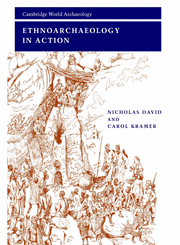Book contents
- Frontmatter
- Dedication
- Contents
- List of figures and credits
- List of tables
- Preface
- Acknowledgments
- Map
- 1 Ethnoarchaeology: its nature, origins, and history
- 2 Theorizing ethnoarchaeology and analogy
- 3 Fieldwork and ethics
- 4 Human residues: entering the archaeological context
- 5 Fauna and subsistence
- 6 Studying artifacts: functions, operating sequences, taxonomy
- 7 Style and the marking of boundaries: contrasting regional studies
- 8 Settlement: systems and patterns
- 9 Site structures and activities
- 10 Architecture
- 11 Specialist craft production and apprenticeship
- 12 Trade and exchange
- 13 Mortuary practices, status, ideology, and systems of thought
- 14 Conclusions: ethnoarchaeology in context
- Bibliography
- Index
5 - Fauna and subsistence
Published online by Cambridge University Press: 05 March 2015
- Frontmatter
- Dedication
- Contents
- List of figures and credits
- List of tables
- Preface
- Acknowledgments
- Map
- 1 Ethnoarchaeology: its nature, origins, and history
- 2 Theorizing ethnoarchaeology and analogy
- 3 Fieldwork and ethics
- 4 Human residues: entering the archaeological context
- 5 Fauna and subsistence
- 6 Studying artifacts: functions, operating sequences, taxonomy
- 7 Style and the marking of boundaries: contrasting regional studies
- 8 Settlement: systems and patterns
- 9 Site structures and activities
- 10 Architecture
- 11 Specialist craft production and apprenticeship
- 12 Trade and exchange
- 13 Mortuary practices, status, ideology, and systems of thought
- 14 Conclusions: ethnoarchaeology in context
- Bibliography
- Index
Summary
… successful farmers have social relations with one another while hunter-gatherers have ecological relations with hazelnuts.
(Richard Bradley 1984: 11)… as the choice of food species is a cultural phenomenon, techniques themselves are the result of choices made by a culture. These choices are made in accordance with goals it has set itself, but also in accordance with all sorts of social representations which, although some way removed from techniques, partly determine the local ways and means of acting on the environment.
(Pierre Lemonnier 1993: 680)Beginning in the 1950s archaeologists such as Grahame Clark (1954) at Star Carr in England began the systematic recovery of faunal and plant remains in order to reconstruct prehistoric subsistence. Clark (1952) himself had sought material for analogy in European folk practices, and, both then and now, archaeologists have turned for assistance to a rich ethnographic, experimental, ethnobotanical, and historical literature. Merely to give an indication of the range of such sources, and limiting ourselves to North America, we might cite Wilson's (1917) Agriculture of the Hidatsa Indians, Wright's (1993) simulated use of experimental maize grinding tools, Nabhan's (1985) Gathering the desert, and Crader's (1984) use of historical sources in her study of the zooarchaeology of Thomas Jefferson's residence at Monticello. So rich and varied indeed is the literature that, when ethnoarchaeologists have undertaken studies of subsistence, they have done so with very particular archaeological questions in mind.
- Type
- Chapter
- Information
- Ethnoarchaeology in Action , pp. 116 - 137Publisher: Cambridge University PressPrint publication year: 2001

